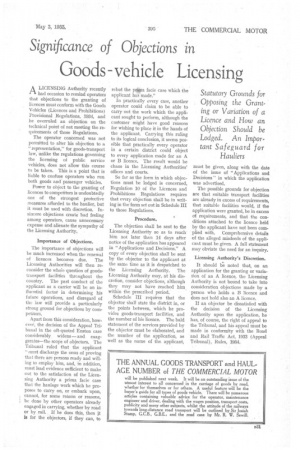Significance of Objections in
Page 45

If you've noticed an error in this article please click here to report it so we can fix it.
Goods vehicle Licensing
A LICENSING Authority recently I-1 had occasion to remind operators that objections to the granting of licences must conform with the Goods Vehicles (Licences and Prohibitions) Provisional Regulations, 1934, and he overruled an objection on the technical point of not meeting the requirements of those Regulations.
The operator coneerned was not permitted to alter his objection to a "representation," for goods-transport law, unlike the regulations governing the licensing of public service vehicles, does not allow this course to be taken. This is a point that is liable to confuse operators who run both goods and passenger vehicles.
Power to object to the granting of licences to competitors is undoubtedly one of the strongest protective measures afforded to the haulier, but it must be used with discretion. Insincere objections create bad feeling among operators, cause unnecessary expense and alienate the sympathy of the Licensing Authority.
Importance of Objections.
The importance of objections will be much increased when the renewal of licences becomes due. The Licensing Authorities will then reconsider the whole question of goodstransport facilities throughout the country. The past conduct of the applicant as a carrier will be an influential factor in determining his future operations, and disregard of the law will provide a particularly strong ground for objections by competitors.
Apart from this consideration, however, the decision of the Appeal Tribunal in the oft-quoted Enston case considerably, widens— and exaggerates—the scope of objectors. The Tribunal ruled that the applicant " must discharge the onus of proving that there are persons ready and willing to employ him, and, in addition, must lead evidence sufficient to make out to the satisfaction of the Licensing Authority a prima facie case• that the haulage work which he proposes to carry on, or embark upon, cannot, for some reason or reasons, be done by other operators already engaged in carrying, whether by road or by rail. If he does this, then it is for the objectors, if they can, to
rebut the prima facie case which the applicant has made."
In practically every case, another operator could claim to be able to carry out the work which the applicant sought to perform, although the customer might have good reasons for wishing to place it in the hands of the applicant. Carrying this ruling to its logical conclusion, it seems possible that practically every operator in a certain district could object to every application made for an A or B licence. The result would be chaos in the Licensing Authorities' offices and courts.
So far as the form in which objections must be lodged is concerned, Regulation 10 of the Licences and Prohibitions Regulations requires that every objection shall be in writing in the form set out in Schedule III to those Regulations, Procedure.
The objection shall be sent to the Licensing Authority so as to reach him not later than 14 days after notice of the application has appeared in "Applications and Decisions." A copy of every objection shall be sent by the objector to the applicant at the same time as it is despatched to the Licensing Authority. The Licensing Authority may, at his discretion, consider objections, although they may not have reached him. within the prescribed period.
Schedule III requires that the objector shall state the district in, or the points between, which he provides goods-transport facilities, and the number of his licence. The bald statement of the services provided by the objector must be elaborated, and the number of the application, as well as the name of the applicant, must be given, along with the date of the issue of "Applications and Decisions" in which the application was advertised.
The possible grounds for objection are that suitable transport facilities are already in excess of requirements, that suitable facilities would, if the application were granted, be in excess of requirements, and that the conditions attached to the licence held by the applicant have not been complied with. Comprehensive details of the alleged misdeeds of the applicant must be given. A full statement may obviate the need for an inquiry.
Licensing Authority's Discretion.
It should be noted that, on an application for the granting or variation of an A licence, the Licensing Authority is not bound to take into consideration objections made by a person who holds a B licence and does not hold also an A licence.
If an objector be dissatisfied with the decision of the Licensing Authority upon the application, he has, of course, the right of appeal to the Tribunal, and his appeal must be made in conformity with the Road and Rail Traffic Act, 1933 (Appeal Tribunal), Rules, 1984.




























































































